A New Wave of Intercultural Sharing on UBC’s Okanagan Campus
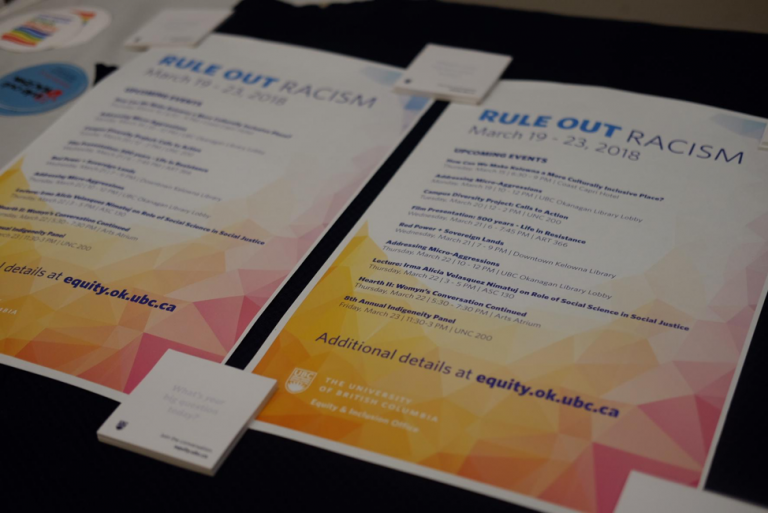
The latest hashtag to grace our phone screens last month? #RuleOutRacism2018. The hashtag hashtag represents an annual weeklong campaign run by the Equity & Inclusion Office, that, since 2013, seeks to increase awareness and literacy around race and racism at UBC Okanagan.
Timed to raise awareness of the International Day for the Elimination of Racial Discrimination (March 21st), the campaign was a collaborative initiative that brought together voices from across the university and the region, resulting in a series of heartfelt and educational events.
Highlights from the Week
A Dialogue with Alumni UBC: “How can we make Kelowna a more culturally inclusive place?”
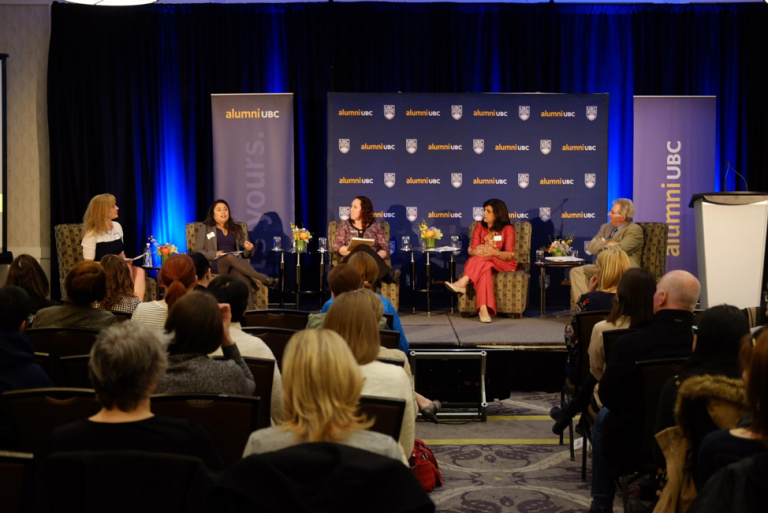
The first event was organized in collaboration with Alumni UBC. They hosted a dialogue around the question of “How can we make Kelowna a more culturally inclusive place?.” A panel of diverse speakers discussed the intricacies of Canada’s silent discrimination. Panelist and UBCO Nursing Assistant Professor Dr. Susana Caxaj noted that “In Kelowna, access is an issue – both in terms of getting to resources, as well as accessing them.”
Challenges discussed include a lack of mental health resources that cater to intercultural needs, as well as affordable and safe housing for low-income migrant workers. There were about 65 people who attended the event, including alumni, community members, and UBCO staff, faculty and students.
Addressing Micro-Agressions: Campus-wide Educational Outreach
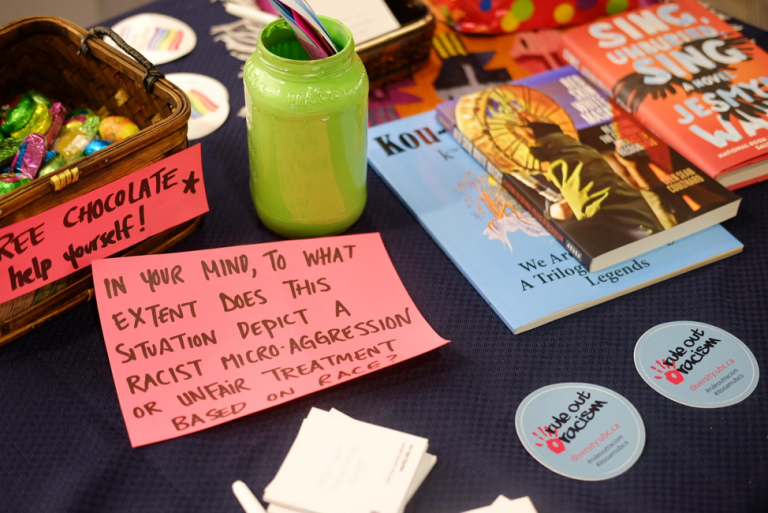
A micro-aggression is a form of subtle or unintentional discrimination directed toward a racialized individual. As an isolated event, these actions may seem harmless and even funny. However, over time they become internalized and contribute toward the “othering” of racialized people.
The Equity & Inclusion Office took the lead on several educational initiatives throughout the week, including hosting an interactive booth aimed to build capacity of individuals to address micro-aggressions on campus.
The booth in the library encouraged students to deconstruct problematic behaviours that we hear and say, but aren’t always sure how to challenge. A micro-aggression is a form of subtle or unintentional discrimination directed toward a racialized individual. It’s like when someone pulls on your braids without your permission, or says that you should feel complimented when they pet your afro like you’re a dog. As an isolated event, these actions may seem harmless and even funny. However, over time they become internalized and contribute toward the othering of racialized people. Fellow work study student Amal Hassan reflected that “having a booth addressing micro-aggressions was important since these incidents occur many times without notice”. Work study student Sayma Hussain shared a similar sentiment in stating “sometimes an individual may not be aware that certain things they are saying or doing may appear racist…it’s important to be open-minded at all times.”
Certainly, the booth generated a lot of ideas for students, and helped to shed light on something that many racialized students face both on and off campus. As a follow up to the conversations at the booth, EIO partnered with Kelowna Community Resources to provide a free workshop, open to the public, on Anti-Racist Allyship. The workshop was facilitated by Jenica Frisque, Equity Facilitator, and Joban Dhanoa, a Masters of Social Work student, and was attended by 14 people from across campus and the community.
Our take-away? Allyship is an action, rather than an identity. It takes time, practice, and patience to unlearn prejudice and bias based on racism and colonialism.
Campus Diversity Report Released
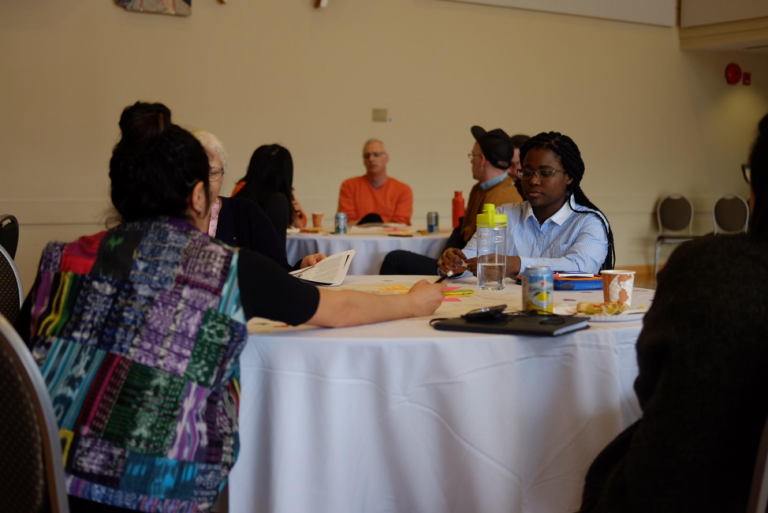
The second major event on March 20th was the launch of the newly released Campus Diversity Report. Written and edited by a research team made up of UBC Okanagan faculty and students, the report highlights the inequalities and discomforts experienced by racialized, and/or Indigenous, and/or queer students on campus. As a person of colour on campus, I found the Campus Diversity Report did an amazing job of expressing some of the concerns that I feel and see around me. Sayma noted that “improvements are needed in Health and Wellness”, so that culturally diverse and queer students can feel welcomed and understood. The report also brings attention to the consolidation of information and expression, the process which leads to us being taught a very particular version of history. Amal also reflected that “not enough classes address the systemic ways that power and white privilege” take precedence in the university setting. Ultimately, both the report and the discussions facilitated during the event called for more intercultural-minded resources that can support international students and those who would otherwise fall through the “cracks in the system”.
A Womyn’s Conversation
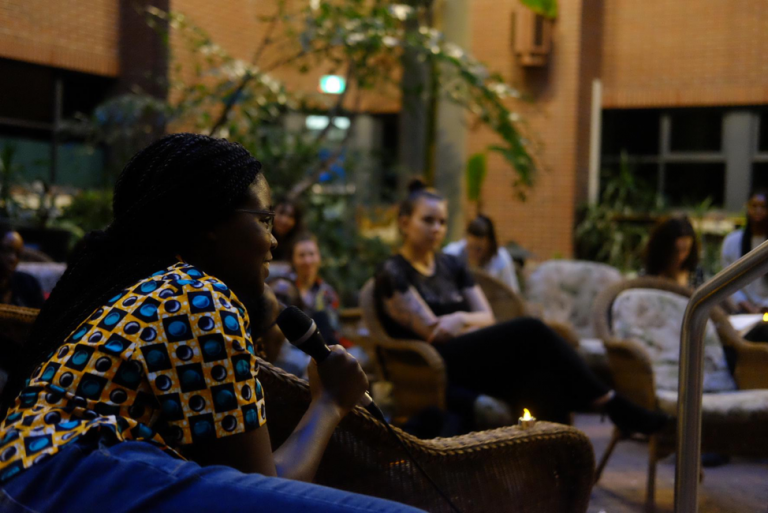
EIO was proud to collaborate with the International Programs and Services to host Hearth II: A Womyn’s Conversation Continued. The first Hearth event happened during Black History Month. The event seeks provide an inclusive space in which panelists and audience members share their thoughts on current issues around womanhood, race and Indigeneity in Canada, and obstacles toward diversity. In the cool of the Arts Atrium, participants gathered around as panelists laid down knowledge on the plight of racialized women – women who are most noticeably the most disenfranchised individuals in any society.
8th Annual Indigeneity Panel
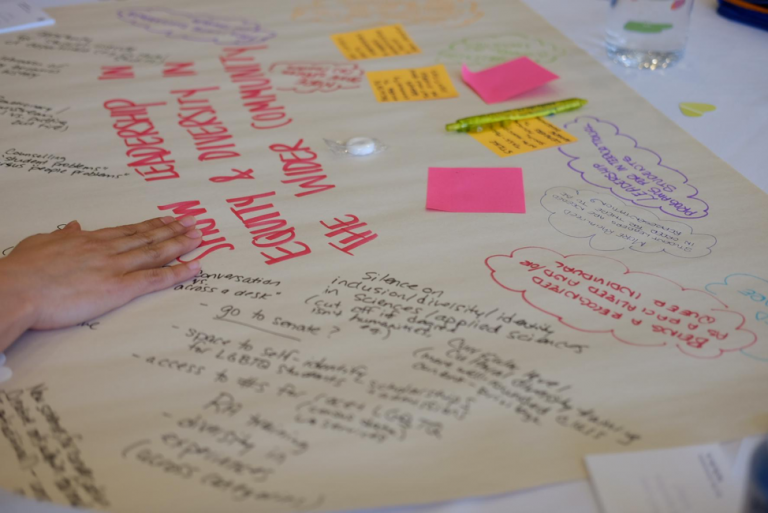
The final event was the “8th Annual Indigeneity Panel” event organized by the IKBSAS Cultural, Community and Global Studies department. At the event panelists encouraged Indigenous students to embrace and continue the learning found in Indigenous studies. Likewise, Indigenous students were encouraged to embrace their truth and be voices in academia, so that more Indigenous knowledge can be included across institutions.
Wrap Up
#RuleOutRacism2018 brought together diverse members of our UBCO students, faculty, and staff community and provided safe spaces where racial identity on campus could be unpacked. From the week long social media campaign on Instagram, to people staying after events to ask more questions, the week proved to be a fruitful opportunity to learn and unlearn how we see race on campus. Consider keeping the conversation going by volunteering as an Equity Ambassador or stopping by the International Programs and Services to learn more about the Intercultural Development Program!
Story Credit: Dela Hini is a Work-Learn student staff member of the Equity & Inclusion Office. Dela helped organize several of the above events. The above is a reflection of their experience.
Q&A: Working to Build a More a Accessible Campus Community
As part of recognizing those who are working to remove barriers to participation, we connected with Earllene Roberts, manager of the Disability Resource Centre at UBC Okanagan. She shares with us her perspectives on building a more accessible and inclusive UBC.
Why do you think it is important to mark the National AccessAbility Week?
Now in its second year, the National AccessAbility Week is an opportunity to celebrate contributions of persons with disabilities, and consider ways that we can continue removing barriers to participation so that we build a more inclusive UBC. It’s an opportunity to think about what more we can do to promote the rights and well-being of persons with disabilities in all spheres of society and development, and to increase awareness of the situation of persons with disabilities in every aspect of political, social, economic and cultural life.
This week serves as a continued reminder of the situation that persons with disabilities still face. The mainstream discourse does yet not fully value the many contributions of disabled people and communities. For me, this week is about recognizing how our daily practices matter in terms of whether individuals, all individuals, feel included or not.
It’s really important to recognize this week. Not just one week per year. It’s about recognizing how our daily practices may be contributing to continued propagations of stereotypes and discrimination, and about reflecting on how we can all play a part in changing that.
How have things changed in recent years? What do you think would contribute to a more positive environment for people with disabilities in the workplace?
Things have certainly changed, but in the post-secondary context, people with disabilities are still significantly under represented.
In the post-secondary context, people with disabilities are significantly under represented. 27 per cent of Canadians have post-secondary degrees, as opposed to 14 per cent of disabled Canadians. As a result, these individuals often experience increased rates of poverty, lower involvement in the labour market, higher under employment and unemployment.
At the institutional level, we are working to create inclusive places for all people on campus, taking action to ensure adequate policies are in place, and making efforts to remove barriers that enable discrimination and prevent inclusion.
In order to contribute to a more positive environment, we need to look at everything that we do and take into consideration how discrimination operates – and voices of persons with disabilities are essential to these conversations. We’ve done that with other groups on other issues, so it is definitely possible.
Lastly, we also need to move beyond awareness alone and our legal duty to accommodate. While progress to date has been made largely through legal mechanism, we need to focus on reinforcing an inclusive culture where disabled people are seen as valuable members of society. Through these efforts, we want to see our disabled community members achieve same successes as non disabled people (able-bodied person).
How can students, staff and faculty members get involved in supporting a better environment for all people with disabilities on campus?
A lot of research has been done around what factors either advance or act as a barrier to inclusion. The recommendations that come out of the literature tend to focus on awareness of issues, training for faculty, and implemention of specific policies – those are all great – however, we need to continue to shift the culture at universities away from primarily ableism.
For example, our students can make a big difference to our culture by doing something as seemingly simple as how they value group work participation, how they understand how different people may approach or process the work, or do the work, and how they perceive the value of those contributions. Through these efforts with our students, staff and faculty, we are continuing to foster an environment where individual differences are valued for the benefits they can bring.
Lastly, I urge staff and faculty to reflect on how they think and talk about disability and their day-to-day actions People don’t always recognize that they’re being ableist or discriminatory. We’re seeing progress, however, there’s still work to do so that we all are comfortable with recognizing how our actions can contribute to a discriminatory culture.
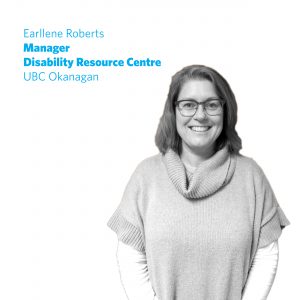
Additional Resources
Community Projects Awarded Funding to Build a More Inclusive UBC
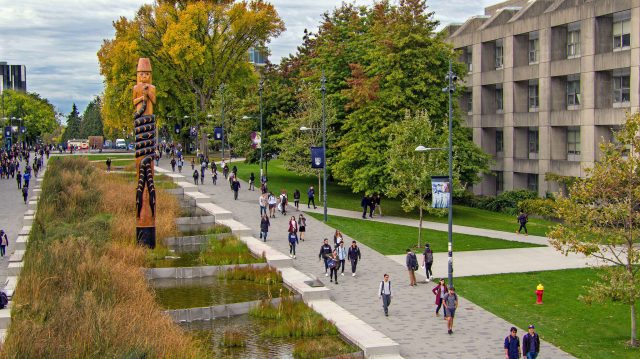
18 student, faculty and staff projects are awarded funding from the UBC Equity Enhancement Fund. Projects will engage the campus community in building a more welcoming and inclusive UBC.
As part of the annual Equity Enhancement Fund call for applications, the Equity & Inclusion Office received 37 submissions for a total of $406,000 in requested funding. With $90,000 in the Equity Enhancement Fund available for disbursement, an internal adjudication panel evaluated applications and selected 14 projects at UBC Vancouver and four at UBC Okanagan to receive funding.
This year’s projects focus on diverse areas of equity and inclusion work, including race and culture, sexual orientation and gender identity, gender equity, and indigeneity. A number of projects also seek to inform broader campus experiences across teaching, learning and research, and community engagement.
Associate Vice-President Sara-Jane Finlay praised the quality and variety of this year’s projects.
“It was wonderful to see all the creative ideas in the applications received – however, that also made it more difficult to make the final selection. The selected projects focus on bringing benefits to the representation or experiences of those people who have been historically marginalized, and seek to build the competencies of our students, staff and faculty to engage with diversity.”
The Equity Enhancement Fund is open to students, staff and faculty as a way to support collaborative community-led initiatives that engage the community and help advance equity and inclusion at UBC.
Each year, a total of $90,000 is available for disbursement across UBC Vancouver ($75,000) and UBC Okanagan ($15,000) campuses. Individual projects can receive up to $25,000 at UBC Vancouver, and up to $10,000 at UBC Okanagan.
Call for applications opens in January each year and is widely broadcast across the university. The Equity & Inclusion Office hosts workshops and events to showcase past projects and support those interested in applying.
Inclusion is one of the key priority areas in UBC’s new strategic plan, Inspire, and these projects will now play an important role in helping to build a more inclusive UBC.
Reflections from Past Participants
“The Equity Enhancement Fund we secured two years ago catalyzed an extremely effective project, Teacher Education For All. It has grown into a Faculty-wide initiative highlighting SOGI-inclusive culture and practices.”
- Wendy Carr, Associate Dean, Teacher Education Faculty of Education
“The Equity Enhancement Fund has been critical to the success of the Wingspan Disability Arts, Culture and Public Pedagogy’s cluster success, drawing attention to the neglected turn of disability in social justice work at UBC and beyond.”
- Professor Leslie Roman, Co-Chair, President’s Working Committee on Disability Culture, Art and Equity
“The Equity Enhancement Fund not only provided us funds to do great things, but helped spark a more strategic conversation about what our unit needs and gave us latitude to experiment.”
- Sarah E Gergel, Associate Dean, Diversity & Inclusion Faculty of Forestry
Funded Projects
UBC Okanagan
This project seeks to use storytelling to engage the campus community in a discussion on the validity of non-western ideas as epistemologically valid. The projects is positioned as essential to the internationalization and indigenization of the curriculum in a global society.
Primary contact: Mundia Kabunda, Student, Bachelor of Arts
Additional contacts and/or parties involved: UBC Students' Union Okanagan
UBC Creative Studies faculty work with various non-profit LGBT groups to present queer cultural events significant to that community, and which promote positive health benefits for the community. These events are: a World AIDS Day memorial event/literary reading in support of the Living Positive Resource Centre, a performance cabaret featuring student performers alongside local and lower mainland talent, run in conjunction with the Guythering, organized by the Men’s Health Initiative, an LGBT film series, and a queer comedy night fundraiser (combining grad student talent with pro comedians) to keep the series sustainable. This creative research programming designed in partnership with LPRC, the Men’s Health Initiative and UBCO Creative Studies Faculty will create new access points to LGBTQI2 resources for UBCO students and the greater Kelowna community.
Primary contact: Associate Prof Michael V. Smith, Faculty of Creative and Critical Studies
Additional contacts and/or parties involved: Positive Space
The Indigenous Educational Pathways project intends to examine ways in which Indigenous UBC students access PSE, move between UBC and other institutions, and persist through to gaining PSE credentials. Our team shall conduct focus groups with Indigenous students at both campuses, and we will hold interviews with Indigenous community members and academic experts from each institution. The results of this project will give voice to this historically marginalized population on campus, inform the UBC community and broader public of contemporary issues surrounding Indigenous students in PSE, and finally work to influence positive institutional and provincial policy changes concerning Indigenous students in PSE. We have recently received research ethics approval for this project, and we are happy to provide the approval notice if necessary.
Primary contact: Dr. Stephanie McKeown, Okanagan Planning and Institutional Research
Additional contacts and/or parties involved: UBC Okanagan Aboriginal Programs and Services
With an understanding that there is a Memorandum of Understanding with the University and the Okanagan Nation Alliance to improve the relationship with Okanagan First Nations and to have more Indigenous women’s voices to be heard, this project seeks to bring in Dr. Michelle Jack for a one day speaking event on campus that is open to all students and the community. Dr. Michelle Jack is a professor at the En’owkin Centre teaching cultural arts and history of and about her community. Engaging Dr. Michelle Jack's seeks to support the value of local oral history and all that it has to teach us in connecting with the land. The Okanagan campus also has a Memorandum of Agreement with the En’owkin Centre.
Primary contact:Barb Dawson, Student, Faculty of Creative and Critical Studies
Additional contacts and/or parties involved: UBC Okanagan Aboriginal Programs and Services
UBC Vancouver
The F-Word Conference is a student-run initiative providing a platform for community-based collaborative work on social injustice. This year, the project seeks to facilitate discussion surrounding issues of climate change, food sustainability, Indigenous land rights, race and space, ableism, gentrification, queer studies, and reproductive rights. The F-Word conference is attended by students, faculty, and members from the UBC community and is deeply involved with issues present on our campus. Our theme directly relates to environmental justice and sustainability by bringing into question the current state of our environment, and how it disproportionately affects marginalized groups. This year, our keynote speaker is Ta’Kaiya Blaney, a young Indigenous activist for environmental rights. Our six workshops are centered around topics relating to climate justice, food (in)security, refugees, sexual assault, divestment from fossil fuels, residential schools.
Primary contacts:Gender, Race, Sexuality, and Social Justice Undergraduate Association
Additional contacts and/or parties involved: UBC Arts Undergraduate Society, UBC Sexual Assault Support Centre, UBCC350
This project will facilitate a community consultation between academic philosophers based in the Vancouver area and members of the local Indigenous communities about the prospects for a dialogue between Indigenous and academic philosophy. Academic philosophy in Canada has been slow to include Indigenous philosophies within the mainstream curriculum, at least partly because of sensitivity to concerns about cultural appropriation. This student-initiated proposal for a collaborative dialogue on how to move forward would assist academic philosophers interested in including Indigenous curriculum in existing courses, and will help address barriers to greater participation of Indigenous students in mainstream academic philosophy as a discipline. It will enhance diversity in UBC philosophy classrooms, and explore models for an equitable and collaborative dialogue between academics and community members.
Primary contacts:Prof. Sylvia Berryman, Department of Philosophy, Faculty of Arts
Additional contacts and/or parties involved:Kwantlen Polytechnical University Aboriginal Club, Department of Philosophy, Simon Fraser University
This project creatively theorizes and critically explores blackness as it relates to the settler land of Canada. How do we consider multiple sites of oppression, both as oppressors (as settlers) and subjects of oppression (as minorities)? How do we situate these questions locally and nationally, whilst building and sustaining relationships between the people that these matters affect? By creating a film and holding public panels, the project aims to foster supportive reflections and contribute to the project of modifying what constitutes the archive. Importantly, focusing on diversity within communities of colour and promoting POC-led initiatives will help to dismantle the framework of White vs. Other. What we intend is to promote conversations about how all communities can live with one another in a meaningful way.
Primary contacts:Emmanuelle Andrews and Pedro Daher, Institute for Gender, Race, Sexuality and Social Justice
Additional contacts and/or parties involved: Institute for Gender, Race, Sexuality and Social Justice
Creation of an online, self-paced module that equips Search and Selection Committees with a baseline knowledge of equity and diversity best practices for the hiring of faculty and leadership roles (deans, vice-deans, assistant deans, associate deans, executives, department heads). The proposed online module will replace a portion of, and act as a supplement to current practices. An online module of this nature enhances the equity, diversity and inclusion of UBC by guiding the selection process for faculty and leadership roles to be more equitable and inclusive, through the identification of qualified and outstanding candidates who may otherwise be overlooked due to the unconscious biases held by members of Search and Selection Committees. The online module will be first piloted in the Faculty of Medicine with the view that this would be available –at no cost- to all faculties and academic units.
Primary contacts:Dr. Gurdeep Parhar, Executive Associate Dean, Clinical Partnerships and Professionalism, Faculty of Medicine
Additional contacts and/or parties involved: Senior Advisor to the Provost on Women Faculty; Faculty of Medicine
UBC can act as a role model for promoting equity and inclusion in recreation, and by doing so can reach an organizational goal of improving health and enhancing overall campus experience. This project proposal is grounded in a vision to integrate research with practice, leverage internal and external partner expertise, and set the foundation to address gaps in recreation service provision to better meet the needs of underrepresented groups.
Specifically, this project involves:
- Research (existing and new): Gather info on participation, barriers to access & facilitating factors, and considerations around culture, perceptions, concerns, beliefs.
- Partnerships: Work cross-campus to understand needs, gaps, and leverage human expertise.
- Capacity building: Develop & deliver staff training, create targeted education campaign, change A&R messaging, target programming.
- Inform department plans: Review, adapt and develop recreation programs, marketing and messages.
Primary contacts: Lizzy Gun, Manager, Physical Activity, UBC Athletics and Recreation
Additional contacts and/or parties involved: School of Kinesiology; Office of the Vice-President, Students
UBC can act as a role model for promoting equity and inclusion in recreation, and by doing so can reach an organizational goal of improving health and enhancing overall campus experience. This project proposal is grounded in a vision to integrate research with practice, leverage internal and external partner expertise, and set the foundation to address gaps in recreation service provision to better meet the needs of underrepresented groups.
Specifically, this project involves:
- Research (existing and new): Gather info on participation, barriers to access & facilitating factors, and considerations around culture, perceptions, concerns, beliefs.
- Partnerships: Work cross-campus to understand needs, gaps, and leverage human expertise.
- Capacity building: Develop & deliver staff training, create targeted education campaign, change A&R messaging, target programming.
- Inform department plans: Review, adapt and develop recreation programs, marketing and messages.
Primary contacts: Chris Lee, Associate Professor, Department of English, and Director, Asian Canadian and Asian Migration Studies (ACAM)
Additional contacts and/or parties involved:St. John's College
Community Development, the Centre for Community Engaged Learning and the Arts and Culture District are proposing to launch a bold, new festival-like conference at UBC for International Women’s Day 2019. This project aims to engage our community of students, faculty, staff the general public in an important dialogue about issues central to the lives of women, trans women, non-binary people and those who face inequalities based on sex and gender identity through discussions, workshops, art and performances that inspire and allow our community to creatively co-create change together. This will not be an ordinary conference; in fact we aim to we aim to strike new partnerships across our campus to provide an event with programming, lessons and celebrations that are as diverse as women themselves.
Primary contacts: Shiloh Bouvette, Manager, Community Programs, Campus + Community Planning
Additional contacts and/or parties involved:Arts and Culture District; UBC Centre for Community Engaged Learning (CCEL)
Multiprofessional and interprofessional opportunities for students to learn from people with visible and non-visible disabilities are offered by Patient & Community Partnership for Education, Office of UBC Health. Our goal is to extend opportunities for all students in health professional programs to learn directly from people living with a disability by producing learning resources illustrating multiple perspectives on stereotypes, barriers to access, and communication challenges. In Phase 1 we conducted needs assessments with students and people with disabilities, developed collaborations with community organizations, created a database of recommended learning resources, developed a workshop model and began to create a digital ‘human library’. In Phase 2 we will maximize use and sustainability of resources through user testing and faculty engagement linked to UBC Health Patient Engagement Framework, and create new resources on experiences of people who are deaf and hard of hearing.
Primary contact: Dr. Angela Towle, Co-Director, Patient and Community Partnership for Education, UBC Health
In Phase 3 of our successful Perspective and Strength project, the Learning Exchange (LE) will enhance our Downtown Eastside
(DTES) orientation materials to fill identified gaps. This project enhances equity by directly involving DTES residents as experts with lived experience, who put a human face to an often misunderstood and underrepresented community, to help counter stereotypes and negative perceptions through orientations. Based on the continuing interest and positive responses to the project thus far, and growing interest from community partners, we would like to create new materials that further reflect the DTES community and its residents in an inclusive, equitable and authentic way.
Primary contact: Kathleen Leahy, Director, UBC Learning Exchange
Additional contacts and/or parties involved: UBC Learning Exchange; UBC Health
In Phase 3 of our successful Perspective and Strength project, the Learning Exchange (LE) will enhance our Downtown Eastside
(DTES) orientation materials to fill identified gaps. This project enhances equity by directly involving DTES residents as experts with lived experience, who put a human face to an often misunderstood and underrepresented community, to help counter stereotypes and negative perceptions through orientations. Based on the continuing interest and positive responses to the project thus far, and growing interest from community partners, we would like to create new materials that further reflect the DTES community and its residents in an inclusive, equitable and authentic way.
Primary contact: Dr. Alison Taylor, Faculty of Education
Additional contacts and/or parties involved: UBC Learning Exchange; UBC Centre for Community-Engaged Learning (CCEL)
The Truth and Reconciliation Commission's Call to Action #92 focuses on the business sector, calling for training in intercultural competency, human rights, and anti-racism. Ch’nook at Sauder wants to take this call seriously. We propose the creation of an Indigenous Cultural Awareness and Sensitivity Training (ICAST) program that will be delivered to all new Ch’nook (largely student) employees. This will be a one week program covering topics related to the history of Indigenous peoples and colonialism in Canada, cultural sensitivity and cross-cultural dialogue, communication principles, as well as better understanding trauma. Furthermore, Ch’nook – in collaboration with the School of Law and Faculty of Forestry – will also host a book club in which participants will read works by indigenous authors and discuss the issues raised in a safe space. The workshop & book club will promote, through education and dialogue, greater competencies & understanding of the importance of equity and inclusion within the UBC community
Primary contact: Kristin Smart, Program Manager, Ch'Nook Indigenous Business Education at the Sauder School of Business
Additional contacts and/or parties involved: Heiltsuk Tribal Council; Peter A. Allard School of Law
The Truth and Reconciliation Commission's Call to Action #92 focuses on the business sector, calling for training in intercultural competency, human rights, and anti-racism. Ch’nook at Sauder wants to take this call seriously. We propose the creation of an Indigenous Cultural Awareness and Sensitivity Training (ICAST) program that will be delivered to all new Ch’nook (largely student) employees. This will be a one week program covering topics related to the history of Indigenous peoples and colonialism in Canada, cultural sensitivity and cross-cultural dialogue, communication principles, as well as better understanding trauma. Furthermore, Ch’nook – in collaboration with the School of Law and Faculty of Forestry – will also host a book club in which participants will read works by indigenous authors and discuss the issues raised in a safe space. The workshop & book club will promote, through education and dialogue, greater competencies & understanding of the importance of equity and inclusion within the UBC community.
Primary contact:Professor Daisy Rosenblum, Faculty of Arts
Additional contacts and/or parties involved:Indigenous Initiatives, Centre for Teaching and Learning Technology (CTLT)
The Africa Business Club is a student initiated club which was created in 2015. The main aim of our club is to shed light on the African continent through the process of unlearning and relearning the notion of Africa being solely a hub for humanitarian aid. In order to do so, our club focuses on business in Africa which is growing at one of the fastest rates in the world and to encourage others to invest in businesses in Africa. Each year, we organize one of the largest African centered conferences in Western Canada where delegates engage in a useful dialogue. The plan for next year’s Africa Business Forum is to expand on this success, maintaining the high quality of speakers and presenters whilst further expanding brand awareness, multi-faculty campus participation and encourage diversity in the pool of participants. The project will support UBCs equity and inclusion efforts in three ways. Firstly, it will increase the intercultural understanding of UBC students have on business business in Africa. Secondly, increase international engagement for students staff and faculty. Lastly, Increase the dialogue on the importance of Business in Africa.
Primary contact: Fatou Kine Ndiaye, Sauder School of Business
Additional contacts and/or parties involved: Faculty of Applied Science; Sauder School of Business; MasterCard Foundation
This project seeks to create and implement a series of professional learning related events and activities that help transform the teaching and learning of Indigenous knowledges, perspectives, and pedagogies within the Faculty of Education. Specifically, we will introduce faculty, staff, instructors, and teaching assistants to Indigenous understandings of health and wellbeing providing comprehensive insight into the complex social, cultural, historical, and economic factors that shape health, wellbeing and healthy living within Indigenous communities with the goal of transforming curriculum and teaching approaches. Our project builds upon the natural synergies of departments within the Faculty of Education intersecting with the diverse course offerings and differently positioned faculty.
Primary contact: Dr. Darren Warburton, School of Kinesiology, Faculty of Education
Additional contacts and/or parties involved: School of Kinesiology, Faculty of Education; Native Indigenous Teacher Education Program; Lytton First Nation; Musqueam Indian Band
The Powwow is currently in its fourth year of running, and has been a great event that has attracted 1000’s of people every year. The Powwow attracts participants in the Powwow from UBC, the local community, other parts of British Columbia, and even Washington State. Currently our budget predicts a cost of 14000 dollars in order to cover the costs of the facility rental, which this year the Alma Mater Society has donated 3500 to cover partial costs, as well as the fees of the performers and costs of the prizes that are given to the dancers and participants, and the Musqueam welcome. The Powwow is a community gathering that attracts both Indigenous people as well as non-indigenous peoples, being on the unceded territory of the Musqueam nation and where UBC is located, this allows students to experience an event like a Powwow which is something that many students here would not have experienced previously.
Primary contact: Tiffany Storry, President, Indigenous Students Association
Additional contacts and/or parties involved: First Nations Studies Students’ Association; UBC Alma Mater Society
A Quick Guide to Ramadan
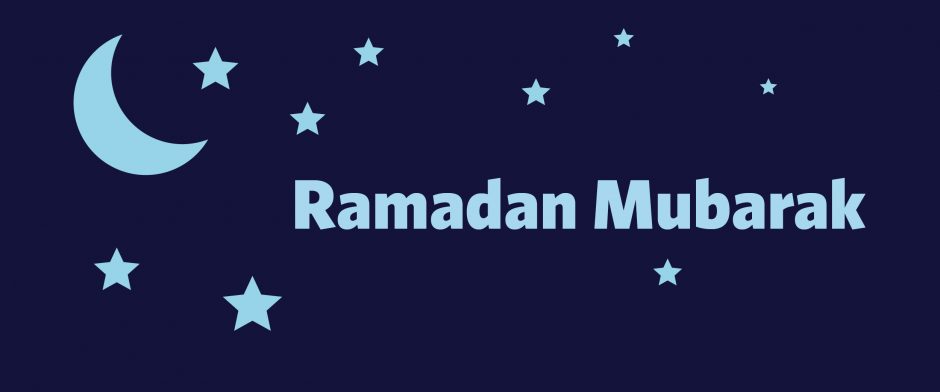
Have your Muslim colleagues and friends suddenly started a 30-day-diet-challenge? They’re choosing not to eat or drink? In fact, they are saying it’s not a diet? It’s probably because it’s Ramadan.
What is Ramadan?
The sighting of the crescent moon marks the beginning of Ramadan, the ninth month of the Islamic lunar calendar. Ramadan, a month of fasting, is observed by some 1.6 billion Muslims all over the world. During the month of Ramadan, most Muslims refrain from food and drink, smoking, and sexual activity from dawn to dusk.
Yet, Ramadan is more than simply an exercise in physical discipline. It is a month of introspection and reflection as well as a time to limit bodily needs and focus on spirituality. Many Muslims take this time to recite and study their holy book, the Quran, which, many believe, was revealed to Prophet Muhammad during this time.
Ramadan is also a time for Muslims to remind themselves of the importance of building community. Families and friends get together for daily meals or exchange food with neighbours to break the fast at sunset. Many Muslims also reach out to less well-off members of their communities by paying the Zakat (an obligatory payment made by those with means in support of charitable purposes) or by sharing food staples and groceries with people in need.
What happens at the end of Ramadan?
The end of the month is marked by the sighting of the new moon and Eid-al-Fitr is celebrated on the first three days of the next month. Common greetings to mark this ocassion include “Eid Mubarak”, meaning “Blessed Eid”, or “Eid Sa’id”, meaning “Happy Eid”. This is a holiday for Muslims to get together family and friends, and may involve children receiving pocket money.
What should one know?
- Not even water? Yes, Muslims can’t even have water during the fast. But, no, you don’t have to be “sorry”.
- Ramadan holds greater significance for Muslims than only refraining from drinking and eating. Some Muslims may not be able to fast (e.g. due to health reasons) – or choose not to – but might still be reflective on other aspects of the month. Try learning what the month means for different Muslims around you.
- Feel free to eat in front of Muslims without being apologetic. To be more inclusive, try not to schedule events during the day that focus on food, such as work lunches or happy hour mixers. If your Muslim coworkers or friends opt not to attend such events, it is understandable.
- You are welcome to join Muslim friends and colleagues for Iftar (breaking the fast). Joining in the communal meal is a great way to learn about and partake in Ramadan festivities. But remember, some may need to leave for Taraweeh, a long prayer held right after Isha’ (the last prayer of the day) during Ramadan so don’t overstay your welcome.
- Be flexible about work and time-off schedules for your Muslim colleagues as it is hard to know the exact dates for Ramadan and Eid ahead of time. Since Ramadan is determined by the lunar calendar, the dates vary every year. If your friends or coworkers need to be a little more flexible once Ramadan begins, try to be as accommodating as possible. It’s no caffeine time for some coffee addicts, so the those early morning meetings can be tough!
- If you know Muslims who observe Ramadan, extend greetings by saying “Ramadan/Ramzan Mubarak” or “Ramadan Kareem”. Your friends and colleagues will appreciate your thoughtfulness.
It’s Rule out Racism Week
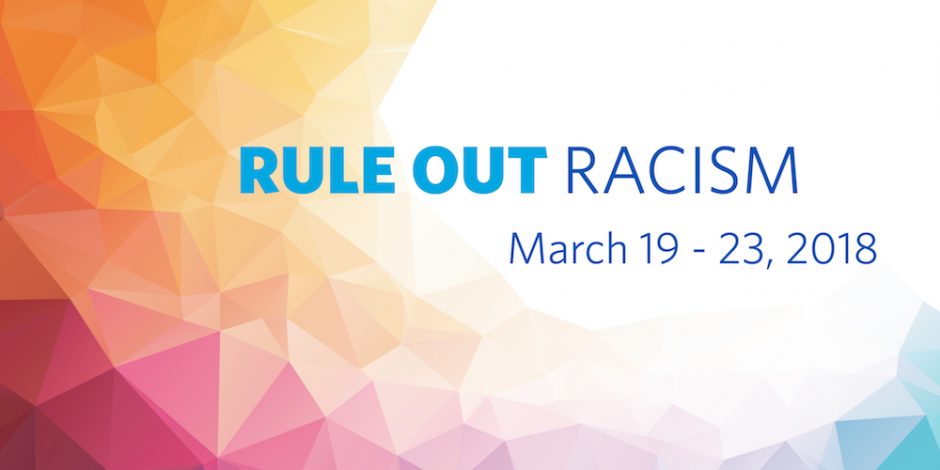
Join us as we Rule Out Racism and celebrate the United Nations International Day for the Elimination of Racial Discrimination on March 21.
Rule Out Racism is a week-long series of events focused on the need for greater literacy and conversation about race and racism.
The series includes a highly provocative program of presentations, discussions and engaging workshops addressing the need for greater conversation about anti-racism practices.
This annual event is designed to engage our UBC community and is organized by the UBC Okanagan Equity & Inclusion Office and the Rule Out Racism committee.
Join us as we take a stand against racism and help build positive space at UBC. Check out the various ways to get involved below.
Events
Addressing micro-aggressions Monday March 19 and Thursday March 22 | 10 – 12 PM | UBC Okanagan Library Lobby
Visit our booth to increase your awareness about racist micro-aggressions, and what you can do as an active bystander.
Campus Diversity Project: Calls to Action Tuesday March 20th | 12 – 2 PM | UNC 200
The Que(e)rying Campus Research Team has finalized their report based on the experiences of racialized and/or Indigenous and/or LGBTQ+ students at UBC Okanagan. The report includes 17 Calls to Action, which will be presented and discussed at this event. Let us know you’ll be there via our Facebook event: https://www.facebook.com/events/149632769050451.
Film Presentation – “500 Years – Life in Resistance” Wednesday March 21 | 6 – 7:45 PM | ART 366
500 Years documents the 2013 genocide trial of former Guatemalan president Efrain Rios Montt, and its aftermath. Rios Montt stood trial for the killing of 1,700 Maya Ixil people from 1982-1983 – the first trial in the history of the Americas for the genocide of indigenous people. When Rios Montt is found guilty, a higher Guatemalan court vacates the verdict – and 500 Years follows the diverse responses among various members of Guatemalan society. Official Selection of 2017 Sundance Film Festival. Director: Pamela Yates. Skylight Pictures. 2017. 1 hour, 48 minutes.
CANCELLED Red Power + Sovereign Lands Wednesday March 21st 7 – 9 PM | Downtown Kelowna Library
This Speaker Series, Indigenous Canada, National Context and Local Perspective, links the national topics presented by the University of Alberta’s online course “Indigenous Canada” to local perspectives.
Lecture with special guest, Irma Alicia Velasquez Nimatuj Thursday, March 22 | 3 – 5 PM | ASC 130
This lecture provides context for the admirable struggle of a group of 15 Maya-Q’eqchi women from Sepur Zarco, Izabal, Guatemala. The case reflects the struggles, but also the obstacles which Indigenous women face when demanding justice and confronting members of the State’s security apparatus. Dr. Nimatuj will address the trial, in which she had the opportunity to contribute as both a researcher and expert witness. Drawing on this experience, she seeks to pose some questions regarding how the social sciences may contribute and serve as an instrument of justice in postwar countries. Presented by: The Department of Community, Culture and Global Studies 2018 Speaker Series.
Hearth II: A Womyn’s Conversation Continued Thursday, March 22, 6:30 – 8 PM | Arts Atrium
As part of the events for Rule Out Racism, we’ve invited the voices from “Hearth: Queen’s Conversation” to continue the discussion on race, gender, and identity. In Hearth II the Queen’s will lead us in an open panel picking up where things left off in February- but don’t worry if you missed the first discussion, because this is an open space for fresh faces and new ideas. Join us for an evening of soul searching, community, and creativity! Facebook event: https://www.facebook.com/events/1968610836788726/. Presented by: International Programs & Services Intercultural Development Program and the Equity & Inclusion Office.
8th Annual Indigeneity Panel Friday, March 23 | 11:30-3 PM | UNC 200
Hear Michelle Hogue talk on “Land as Mentor, Teacher, Curriculum. Land as Responsibility” and Sakej Henderson on “Post-colonial ghost dancing in Academy”. Presented by: UBC Okanagan’s Indigenous Studies Program and the Department of Community, Culture and Global Studies.
Pride Flag Raising Ceremony and Out Week Launch
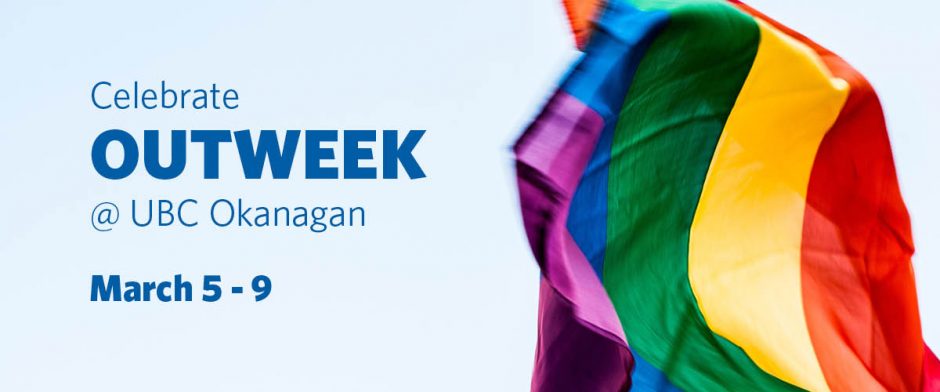
Join the Equity and Inclusion Office and the Pride Resource Centre for a Pride flag raising ceremony and help kick-off this year’s Out Week (March 5th to 9th) at UBC Okanagan.
Opening remarks by UBC Student’s Union Okanagan Pride Resource Centre and enjoy musical performance by UBC Okanagan Beats.
Refreshments will be provided.
Monday, March 5th, 10 AM at the UBC Okanagan Courtyard.
Let us know you’ll be there and invite your friends and colleagues.
